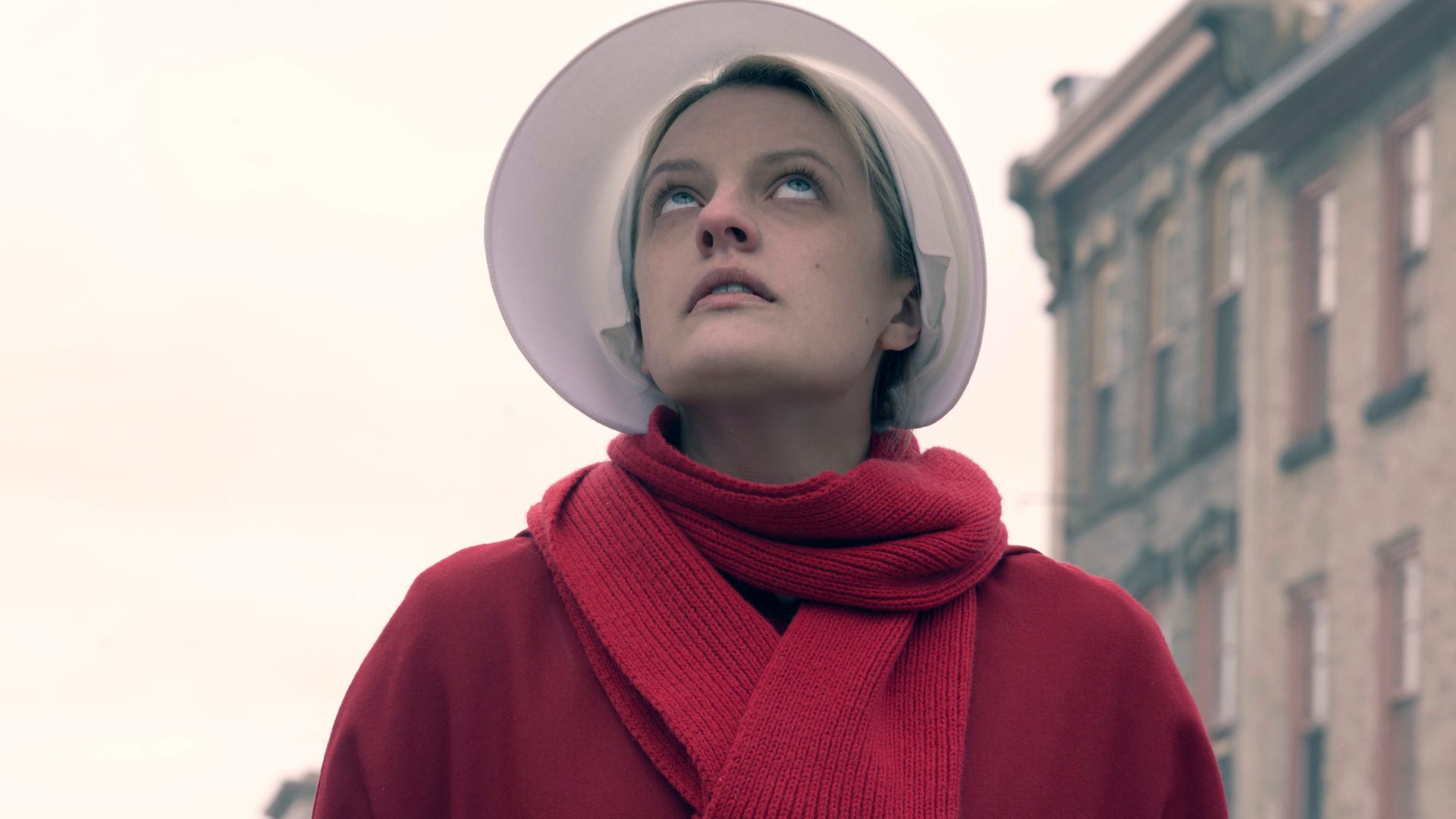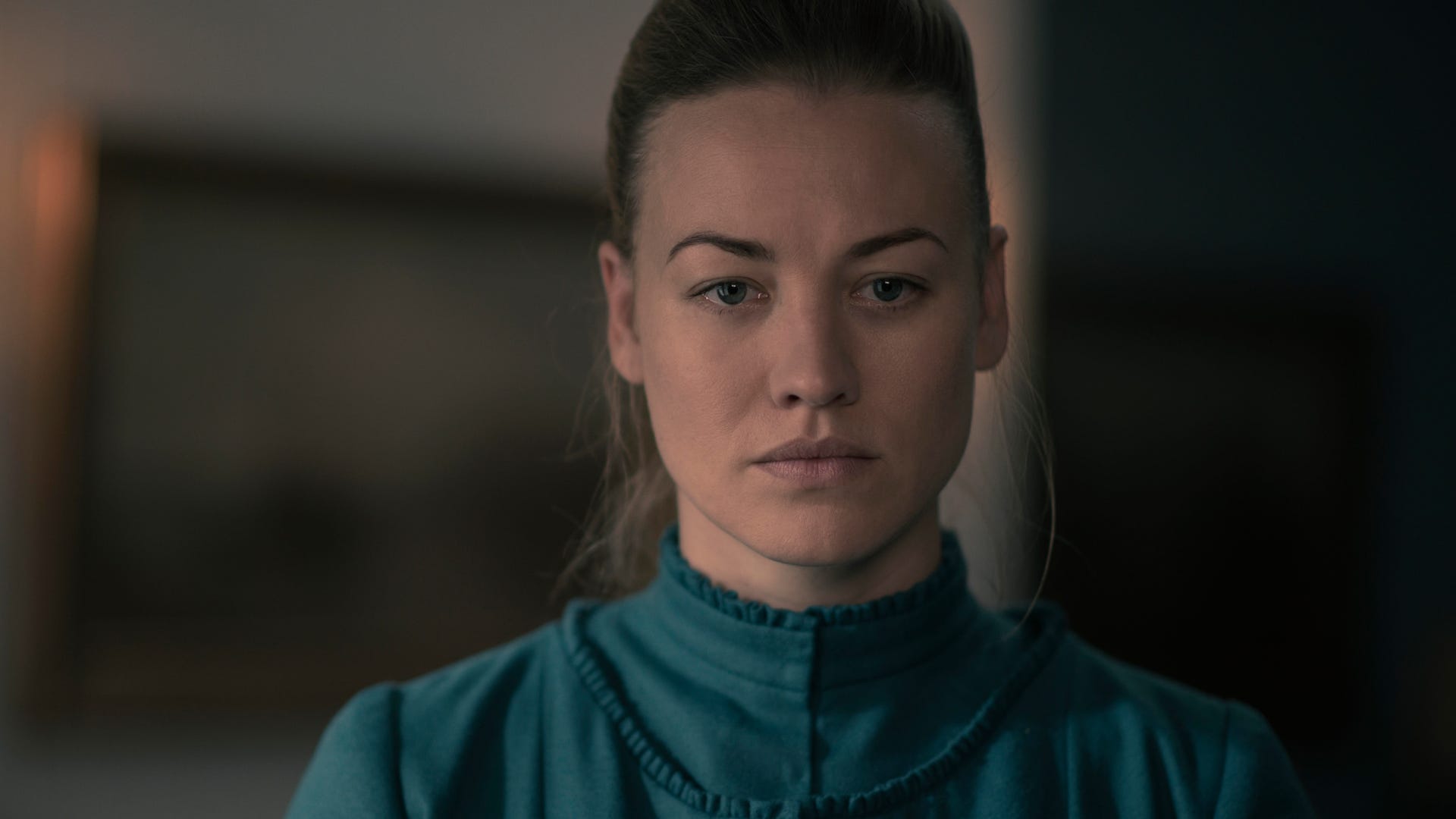Join or Sign In
Sign in to customize your TV listings
By joining TV Guide, you agree to our Terms of Use and acknowledge the data practices in our Privacy Policy.
The Handmaid's Tale Season 3 Review: Still Brutal, But There's Hope
Are things finally looking up in Gilead?
This review includes spoilers from the first three episodes of Season 3 of The Handmaid's Tale. Read at your own peril!
Welcome back to another installment of Hulu's The Handmaid's Tale, or, as I like to call it, The Emotional Hellscape Torture Porn Hour. I hope the liquor cabinet is well-stocked because Season 3's premiere, "Night," gave us some much-needed, oh-so-tantalizing hope... and that means that soon, June (Elisabeth Moss) is going to be water-boarded for Jesus to, like, a Talking Heads song or something, while Gilead sets a schoolhouse full of puppies on fire as punishment for admitting that Canada exists.
"Night" picks up immediately after Emily (Alexis Bledel) and baby Nichole get in the truck bound for the Canadian border at the end of the Season 2 finale, "The Word." June made the decision to stay behind, unwilling to leave without her oldest daughter, Hannah (Jordana Blake), and hitches a ride back to the Waterfords' and certain punishment from occasionally-benevolent weirdo Commander Lawrence (Bradley Whitford). For once, rather than being dragged screaming back to Gilead, June returns on her own terms, and those terms make all the difference in what Season 3 is going to be about.

Elisabeth Moss, The Handmaid's Tale
Elly DassasThe Handmaid's Tale's Elisabeth Moss Previews June and Serena's Tentative Alliance in Season 3
The first two seasons of The Handmaid's Tale showed us a woman desperate to leave, and our hopes were tied entirely to June's freedom. This had the inadvertent effect of forcing the show into a dismal routine of escape and capture, each one more painful than the last. How many times were we supposed to watch June come within sight of her freedom only to be dragged back, screaming, into the dark? It was an unsustainable system... kind of like Gilead itself.
The cracks are showing as we return in Season 3 and June's return signals the end of the old ways. This isn't a show about a woman running away anymore. This is a show about women fighting back.

Yvonne Strahovski, The Handmaid's Tale
Elly DassasSerena Joy (Yvonne Strahovski) made some surprising steps toward regaining her humanity last season and while it's hard to accept that anyone in a blue dress on this series isn't a total sociopath, that progress seems to be continuing in the first three episodes of the season. I mean, the woman helped usher in a brutally subjugating Christofacist regime because she like, really wanted a baby. She helped her husband brutally rape their family sex slave because she was impatient with the whole baby-birthing process. Burning the house down in response realizing she still has a soul somewhere underneath all of her bitterness wasn't entirely unexpected... but it was so satisfying.
As though trying to make up for two seasons of abuse, The Handmaid's Tale offers up several of those satisfying moments as Season 3 opens. It's weird to be crying over this show for happy reasons, but here we are.
But let's not get ahead of ourselves -- June may find herself in a new house with a newer, marginally freer existence, but we can all agree that Bradley Whitford's Commander Lawrence is not to be trusted, right? Fred Waterford (Joseph Fiennes) warned June that Lawrence is a brilliant survivor who doesn't like to be bored. The man's home is ground zero for the Martha resistance operations and he seems to be rather okay with that, but is that because he secretly wants to destroy the culture he was instrumental in building? Or was he bored in his self-made utopia, and this whole resistance thing is just an elaborate game?
Everything We Know About The Handmaid's Tale Season 3 So Far
My money is on game, because it's hard to watch this show without being cynical. Also, Commander Lawrence himself all but revealed his hand after humiliating June in a meeting with the other commanders, mocking her insistence that he must have some sort of humanity in him somewhere, that he does the occasional good deed in order to sleep at night. He whisked her off to a warehouse where a horde of captured women, fresh from the battleground of Chicago, have been shipped back to Gilead for repurposing. There are five open Martha positions. There are over 60 women being held captive. The women who are not chosen to become Marthas will be shipped off to the colonies for what is most certainly, a long, painful death.
Bored monster or not, Lawrence at least seems to understand the gravitas of what he helped build in Gilead, which is weirdly welcome after two seasons of the ruling class approaching everyone below them as a disposable item. Lawrence sees the women as disposable resources as well, repeatedly asking June how she was useful in her old life versus how she is useful now. Everything in Gilead has a purpose. Everyone in Gilead has a role. It's brutal and awful, but it's a system that, on paper, worked well, and in practice, well... people are complicated, but Lawrence still sees himself as a guy who saved the world. It would totally work if people would just stop being people, people!
When June's eagerness to ramp up the underground activities happening in Lawrence's house result in a dead Martha and a visit from the Eyes, Lawrence makes June bury the dead woman by herself, literally forcing June to bear the weight of her decisions.
Discover your new favorite show: Watch This Now!
Later, Lawrence hands June the files compiled for the women awaiting their fates and tells her to choose which five get to survive for a little longer. June is disgusted and horrified by the cruelty of a man who, quite frankly, she started to idealize.
The thing is, Lawrence also gave June a valuable opportunity. By allowing June to choose which women became Marthas, Lawrence allowed June to hand pick the women who would be assets to the underground, to determine which women would be useful and had value. It was, essentially, a sick and cruel gift, and one that, by the end of "Useful," June had accepted, recruiting five women with various backgrounds that sounded like they'd be pretty handy in a secret organization to bring down the government.
June's willingness to get dirty attests to the change in direction for The Handmaid's Tale. She is willing to do things that are, objectively, horrible, but with the understanding that if she is the one doing the bad thing, she can somehow make it less-bad through her involvement. She's sorry it has to be like this. She has good intentions. If she doesn't choose who lives, someone else will, and that person won't care as much. Or no one else will and everyone will die anyway. This is, of course, a very slippery slope. This is probably the same slope that Serena slipped down, justifying awful things in the name of the greater good. Then again, what has taking the high ground ever gotten June in this terrible, brutal world?

Samira Wiley, The Handmaid's Tale
Elly Dassas
As Gilead's foundations crack, the shaking has far-reaching impact. We've already seen that there is no real escape from Gilead in Moira's (Samira Wiley) struggles to move on, heal, and live, safe in the sanctuary Canada provides. Emily, it appears, will fare no better. Three episodes into the season and she still hasn't sought out her wife and son. Routine, mundane things like an eye exam bring her to tears. She wanders around Toronto's busy streets looking like she's still on the run. Like they said on the show itself: There is no happily ever after in Gilead. There's just after.
Gilead taints everything, even this fragile hope that things will be different. June is different, taking her punishments with a defiant, knowing smile. Serena is different, the insulation she wrapped herself in to protect herself from feeling the effects of the system she helped build, ripped out and tossed aside. But none of the good either of these women do will ever completely erase the darkness that they've embraced -- however begrudgingly -- in order to survive.
Notes from the Underground
- Nappy Roots' "Good Day" played over the end-credits for "Night" because this show is all about putting a cherry on top of your sundae before throwing it on the floor and then taking a dump all over it.
- I seriously thought Serena was going to burn the house down and waste Commander Fred and I was sorely disappointed when she didn't.
- Serena's mom suuuuuucks... but she also makes a valid point about Serena's place in Gilead since I'm 100% sure divorce isn't a thing.
- What do you think happens to Gileadean widows though? It might have been in the book but it's literally been like a decade since I've read it.
- Aunt Lydia (Ann Dowd) lives! Ugh. But Ann Dowd plays terribly delightful terrible person so also yay.
- It is my personal head-canon that Commander Lawrence is just an evil Josh Lyman.
- "What do you think the voltage on those things is?" Wow, dude.
- Show of hands: Who else ugly-cried when that nice Canadian border patrol agent asked Emily if she was seeking asylum?